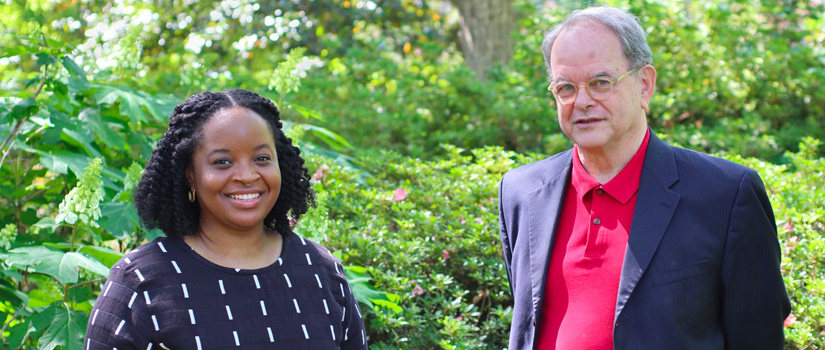Two University of South Carolina English professors are about to dive into the archives of a prestigious library to shed new light on the work of two cultural luminaries.
Faculty members Alyssa Collins and David Shields received coveted fellowships at the Huntington Library, Art Museum and Botanical Gardens in San Marino, California. The Huntington’s fellowships are competitive each year, but this year applications increased 57 percent. Only 8 percent of applicants received fellowships.
One department landing two fellows in such a selective year is “rare and wonderful,” says UofSC English Department Chair Nina Levine.
“It speaks to the strength of the faculty and of Alyssa Collins and David Shields in particular," she says. “Both have exciting archival projects that speak to our moment.”
“Cellular Blackness: Octavia E. Butler’s Posthuman Ontologies”
Collins received the Octavia E. Butler Fellowship, which is named for a widely acclaimed African American science fiction author whose archives are held at the Huntington Library.
According to a press release from the library, “Butler (1947–2006) was the first science fiction writer to receive a MacArthur 'genius’ award and the first African American woman to win widespread recognition writing in that genre.”
Collins’ project, “Cellular Blackness: Octavia E. Butler’s Posthuman Ontologies,” goes beyond the text of Butler’s writing to explore the thought process and research that went into the author’s work.
“The project approaches Octavia E. Butler as a writer, researcher, and theorist," Collins says. “I’ll be looking for and engaging with the significant amount of information she collected and annotated on topics such as biotechnology, cancer and genomics in preparation for her novels.”
Thanks to the Huntington’s extensive collection of Butler’s notes and letters, Collins hopes to uncover “keys to how we might think about the intersections of her work and that of the scientific discourse of the period in which she wrote,” according to the Huntington’s press release.
The Life of Napoleon Sarony
Meanwhile, Shields received the Huntington’s Robert C. Ritchie Distinguished Fellowship. His research will create a more complete picture of the work of Napoleon Sarony, a groundbreaking 19th-Century portrait photographer.
Sarony photographed celebrities such as the actress Sarah Bernhardt and the author Oscar Wilde, but Shields listed quite a few other accomplishments that impacted photography and publishing to this day.
According to Shields, Sarony “created the genre of theatrical photography, secured copyright protection for artistic photography, invented photographic retouching, portrayed every American celebrity of note from the Civil War to the Gilded Age, founded all of the significant Bohemian Artists Clubs of New York, published the first magazine devoted to the portrayal of nudes in the United States, and took photography as far away from mechanical reproduction as any figure in the 1800s.”
And yet, no one has written Sarony’s biography.
“Over the course of my Huntington residency, I will write that biography,” Shields says, adding that a publisher has expressed interest in a book on Sarony.
